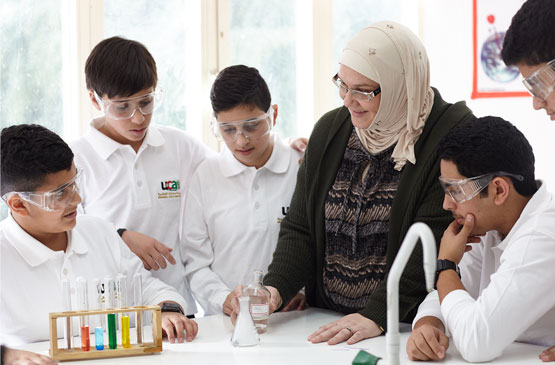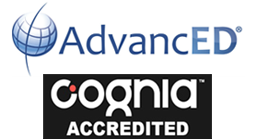
Middle School
Curriculum:
The middle and high school curriculum aims to reinforce the skills previously learned and continue to support and develop moral, civic and intellectual skills and values.
To achieve these goals, each student must have:
Science
Grade 7:
The seventh grade science program explores earth and physical science. In the Earth systems unit, students are introduced to the Earth's biosphere, lithosphere, atmosphere and hydrosphere and learn how they can interact. It is a full year course in which students study the structure and composition of the earth including the earth’s atmosphere, oceans, surface waters, landmasses and interior. Students investigate the dynamics of the earth’s changing surface and the role that energy plays in earth systems. Students learn how the earth’s ecological systems support life through environmental relationships and natural cycles. Students develop an understanding of ecological resources and wildlife conservation. Students relate the flow of matter and energy within an ecosystem.
Grade 8:
Eighth Grade Science is a full year course which focuses on fundamental physics concepts. The content of the course includes concepts dealing with motion and energy. It includes topics such as waves, magnetism and electricity, and forces and motion. Hands-on laboratory-style activities will be used during the course to develop process. Students investigate similarities and differences in living organisms, and how living things have changed over time. Students learn about the human body systems and factors that are responsible for maintaining human health.
Mathematics
Grade 7:
This course will help students develop the skills necessary to solve equations and inequalities. Students will add, subtract, multiply and divide decimals, fractions and mixed numbers. They will understand and solve integers and square roots, write ratios and explore proportions. Students will identify geometric and plane figures, find area, perimeter, surface areas and volume. Finally, students will learn and use the Pythagorean Theorem.
Grade 8:
Algebra I:
This course will help students develop the skills necessary to solve algebraic expression and equations with different steps, use formulas and literal equations, use proportional reasoning, probability, percentage and statistics. This course examines the basic structure of linear functions and slope. Throughout this course, students will develop learning strategies, critical thinking skills, and problem solving techniques to prepare for future math courses and college entrance exams.
Middle School English:
Students in the middle school develop from dependent to independent readers and writers, who read to understand and read for recreation. Students respond to a variety of literature using both literal and critical thinking skills and communicate orally in group settings. The middle school curriculum promotes proficiency in reading, writing, listening, speaking, and research skills. Emphasis is given to developing vocabulary, comprehension, and effective writing skills.
Grade 7:
Grade Seven Language Arts Program places emphasis on the process of reading, writing, listening, and speaking. Course components include the study of a variety of literatures, writing in the genres of narrative, persuasive, expository, and including vocabulary development, spelling, and grammar, along with a balance of oral and written language activities.
Grade 8:
Grade Eight Language Arts Program places emphasis on the continuing improvement of reading, writing, listening, and speaking to ensure success on upcoming levels. Course components include the study of a variety of literature, writing in the genres of narrative, persuasive, expository, and increasing vocabulary development, spelling, and grammar. Also, increasing development of oral and written language activities in an integrated and inter-related manner.
- Social skills needed to interact with culturally diverse people
- Basic skills in various subjects
- skills needed to become successful citizens and life-long learners

